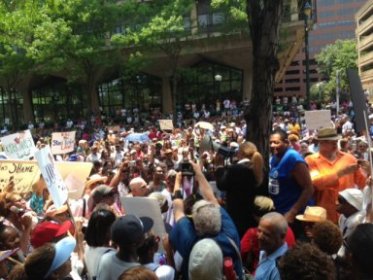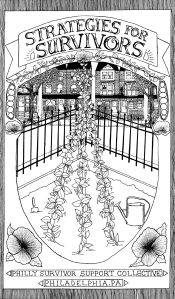In mid-November, West Philly Local’s “Crime Watch” had two posts on robbery and sexual assault. The first headline, posted on November 12, read, “Police release video of suspect sought in robbery, assault of woman at 50th and Hazel” and the second posted November 15, “50th street robbery, assault suspect caught.” Reportedly there were multiple robberies and assaults in this area around this time. As individuals committed to creating collective community accountability and supporting survivors these reports raise many questions. Perhaps most obviously are the racial implications of the video released of the suspect. Watching the video is chilling. Here we are ostensibly being presented with a tool for making our community safer by identifying someone who is causing harm so that he can be stopped, but what we actually see is a video that features an ambiguous subject walking on the sidewalk with no identifying features other than him being a young black male. We have to ask the question: how does this actually help us as members of this community enhance our safety and the safety of our neighbors and the survivor of this assault? And though it goes against the prevailing cultural norms of policing and prisons, we come to only one answer: It simply does not.
And so, sexual assault and the very real need for survivors and communities to regain a sense of safety incite other forms of systemic harm – in this case, the harm caused by policing practices that target black males. The institutionalization of racism through policing is particularly present in Philadelphia and the state of PA — where a $400 million dollar budget for prison expansion was recently approved amidst massive cuts to schools, job training, and other critical social services that actually keep our communities safe.
In no way do we mean to dishonor survivors’ experiences or the choices they make as they seek safety – especially given the limited scope of options available to them. We are not trying to shame survivors choices, but rather we want to ask questions that both honor the needs and experiences of survivors of sexual assault, as well as survivors of the Prison Industrial Complex (PIC), and all those implicated in systems of harm that structure and influence our relationships and communities. We lament the fear, isolation and scarcity of options that survivors feel when it comes to seeking safety and healing after an assault which makes going to the police and relying on a racist and violent Criminal “Justice” System seem like the only answer–even knowing how much more harm these systems will cause, often to the survivor themself.
But we can’t stop there. We want to incite communities to ask these same questions that we are asking ourselves: why do survivors feel they have no other choices than calling the cops, implicating the PIC and other systems of violence? And who is calling the cops even really an option for anyways? What can we do to create alternatives that could actually address the needs of survivors, that could actually help heal and make our communities safer? What would that look like? What is it made of? What can WE do!?
In The Revolution Starts At Home, UBUNTU — a coalition led by women and gender nonconforming people of color, queers and survivors based in Durham, NC — speak about their experiences supporting survivors through alternative community responses/strategies. In it Alexis Pauline Gumbs writes,
“In each case these responses were invented on the spot, without a pre-existing model or a logistical agreement. But they were made possible by a larger understanding that we, as a collective of people living all over the city, are committed to responding to gendered violence. This comes out of the political education and collective healing work we have done, and the building of relationships that strongly send the message, You can call me if you need something, or if you don’t. You can call me to be there for you… or someone that you need help being there for. Since we have come to see each other as resources, we no longer think our only option is to call the state when faced with violent systems.” (Gumbs, 82)
To truly support our communities, we need to ask questions that come from a place of critical compassion; questions that recognize differences and honor multiple stories and truths, so we can act from a place that builds community through supporting one another.
Note: The Revolution Starts At Home started as a zine, the full text of which is available online!

